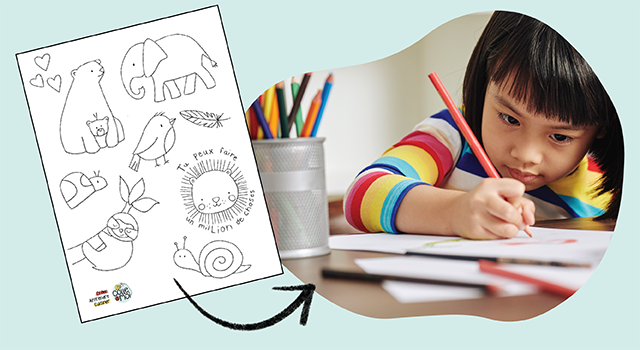A good sense of self, self-confidence can help your child thrive in their life. How can you help them develop self-esteem? This article contains practical suggestions.

How to help your child develop a strong self-esteem
A child that has self-esteem is not only trustworthy but instills trust in others. Healthy self-confidence goes hand in hand with a good sense of respect for self and others, as well as a strong sense of right and wrong or, in other words, good decision-making skills. A strong sense of self helps a child learn who they are, to set realistic goals and to have hope for the future.
Self-esteem is vital for all, but it’s crucial to a child’s development and prepares them for each stage of life.
But what exactly is self-esteem?

What is self-esteem?
Self-esteem is a person’s opinion of themselves, confident despite their imperfections. It’s a realistic view of oneself, appreciative of their strengths and weaknesses, and an awareness of personal value.
Healthy self-esteem develops self-confidence, which pushes a person to action.
5 Areas In Which You Can Help Your Child Develop Self-Esteem
Helping your child develop self-esteem involves more than just saying, “You’re handsome, you’re great, you’re able!”. Here are five areas in which you can help your child develop their self-esteem.
Love. Assure your child that you love them unconditionally, even when you are upset and even when they make mistakes.
Spend quality time with your child, be interested in what they are doing or playing, and ask them to explain and express themselves…then, listen.
Respect. Respecting your child is crucial to the development of their self-esteem. Never belittle them. Even when tensions run high, stay calm and positive.
When speaking to your friends, speak positively about your child, even if you think they can’t hear you. Children listen more than we think, and any negative comments will undermine their self-esteem.
Don’t compare your child to their siblings or friends. Not only can doing so negatively affect their self-esteem, but it also can create rivals. Each child is unique, with their individual strengths and abilities.
Eliminate backhanded compliments from your speech. Expressions like, “You see, you can clean your room when you want to!” do nothing to motivate them into action and damage self-esteem.
When you reprimand your child, it’s essential to put the emphasis on the wrong action and not on the child themselves. It’s not the child that is bad, but the act they committed.
Don’t label your child as lazy, selfish or stupid. You will accomplish nothing but undermining their esteem and confidence. Help them develop good qualities and work on their weaknesses. Perhaps your child is nonchalant or has difficulty sharing. Help them work on those aspects of their personality, rather than labelling them or seeing them as a lost cause. If you, as their parent, don’t feel confident in your child, how will they possibly feel confident in themselves?
Don’t place blame on your child; for example, telling them their poor behaviour in a moment ruined the entire vacation or your day. What you consider slight of the tongue can actually permanently damage your child’s self-esteem. It will hurt them and cause them to carry a weight that they cannot deal with.
Objectives. Self-esteem develops gradually with every personal experience. It’s crucial to provide your child with minor obstacles they can overcome. Help them set realistic goals that are attainable while slightly outside their comfort zone.
Don’t try to control or overprotect your child. Allow your child the opportunity to make their own choices, when appropriate, and let them learn from their mistakes and the natural consequences of their decisions.
Give your children little responsibilities like helping you do the laundry, dust or clean their room. It’s an opportunity for them to feel useful and show that they are capable. Accomplishing these responsibilities is validating.
Encourage your child to embrace their interests. Help them learn to finish what they start by guiding them through a project.
Establish a structured routine with clear rules.
Encouragement. Be sincere in your compliments, but don’t compliment them just for the sake of it. Your child can tell when your words lack sincerity. Remind yourself that your child’s efforts are more important than the results. When your child shares their drawing with you, rather than simply say, it is good, compliment the colour choice, details or the effort they’ve put into it.
Help your child create an achievement binder where they can collect their artwork, exams, cards from friends, etc. They can reflect on the contents when they need a boost. WhitbySchool.org proposes some great activities to help build your child’s self-esteem.
Help your child understand that making a mistake is not a failure. Remind them that you are proud of them and the effort they put into their work. Help them understand how to learn from mistakes and make the necessary changes to do better the next time.
Be realistic in your expectations. No one is perfect, especially a child. Adapt your expectations according to the age and capabilities of your child.
Parental Example. As a final point, don’t forget that the best way to teach someone is by example. Develop strong self-esteem. Your child will likely be drawn to it and instinctively imitate you.
Continue to be positive and expect the best from your child. Helping your child develop a strong sense of self will allow them to be happier and smile more. As they grow older, they will learn to develop their self-esteem in a healthy way and will surpass your expectations when they come across challenges.






